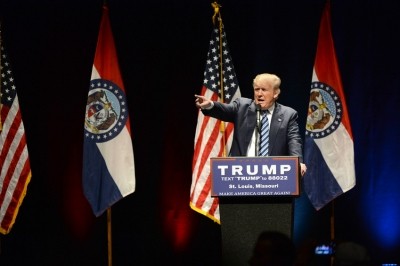Europe reacts with anger as Trump dumps Paris Agreement

Trump said he was acting in the interests of American citizens by pulling out of the accord and the “draconian economic and financial burdens [it] imposes on our country”.
The decision puts the US, the world’s second biggest carbon emitter after China, alongside Syria and Nicaragua, the only other countries to not have signed the treaty.
No renegotiation
The president said he was open to renegotiating the deal to obtain more favourable terms for the US, a suggestion that was firmly rejected by EU leaders.
Mainland Europe's three biggest economies, Germany, France and Italy, issued a joint statement saying: "We note the United States' decision with regret […] We are firmly convinced that the agreement cannot be renegotiated.”
Addressing the public yesterday in the White House’s rose garden, Trump said: “We don’t want other leaders and other countries laughing at us anymore. And they won’t be. I was elected to represent the citizens of Pittsburgh, not Paris.”
Twitter users were quick to point out that Trump actually lost in Pittsburgh while the Mayor of Pittburgh, Bill Peduto, said it was now up to cities to take the lead.
As the Mayor of Pittsburgh, I can assure you that we will follow the guidelines of the Paris Agreement for our people, our economy & future. https://t.co/3znXGTcd8C
— bill peduto (@billpeduto) June 1, 2017
A spokesperson for trade association FoodDrinkEurope (FDE) said it supported the position of the EU’s commissioner for climate action and energy Miguel, Arias Cañete, who “deeply regrets the unilateral decision by the Trump administration.”
“The food and drink sector is 100% dependent on the climate for the production of the raw material it transforms,” FDE said. “Climate change affects the sector, both in terms of production and price stability. Europe’s food and drink manufacturers continue to take action to reduce the impact of climate change both within their operations and beyond.”
Paul Polman, CEO Unilever and chair of the World Business Council for Sustainable Development (WBCSD), said it was "unfortunate".
"Nevertheless, the Paris Agreement remains legally binding and continues to provide a collaborative international framework to manage climate change while strengthening the competitiveness of global markets,” he added.
“Regardless of this decision, the global business community remains committed delivering ambitious climate action to ensure […] a cleaner, more efficient and resilient global economy,” said Polman, adding that the agreement is expected to unlock a $13.5 trillion (€12tn) growth opportunity by 2030 through markets for innovative clean energy and energy efficient technologies.
Whether Trump can, on a legal basis, pull the US out of the agreement before his four-year term ends has been called into question.
Speaking on Wednesday ahead of the announcement, European Commission president Jean-Claude Juncker said: "It would take three to four years after the agreement came into force in November 2016 to leave the agreement.
“So this notion, 'I am Trump, I am American, America First and I'm going to get out of it' — that won't happen.”
“The law is the law and it must be obeyed," Juncker added.
'Rogue nation'
France’s newly-elected president, Emmanuel Macron, said he respected the decision but thought it was a mistake.
“The Paris Agreement is irreversible and will be implemented, Macron said in an English-language address before, in a nod to Trump’s ‘Make our country great again’ election campaign slogan, calling on countries to “Make our planet great again.”
Wenonah Hauter, executive director of US non-profit organisation, the Food and Water Watch, called Trump’s decision a “foolish [and] belligerent” abdication of responsibility.
“The Paris accord falls far short of the bold, decisive action needed to avert the most serious impacts of impending climate chaos – but it is certainly better than nothing,” she said. “By choosing to walk away from the table, the United States effectively becomes a rogue nation when it comes to matters of climate change, human rights and global leadership in general.”
Dr Tara Garnett from the Food Climate Research Network told us: "Food systems play an essential role in delivering on the Paris Agreement's targets, as they contribute with about a third of global emissions. Research clearly shows that reducing emissions including by fostering more sustainable and healthy eating patterns will bring important win-win opportunities, reducing healthcare costs while providing security for future generations."
'Trump will not stop the world moving forward'
Environmental academics also warned that the Trump administration’s decision would disadvantage the US.
Dr Friederike Otto, deputy director of the Environmental Change Institute at Oxford University said: “Having been at the COP in Marrakesh, when Trump was elected and when the reaction of all delegates was not dithering or despair but even stronger commitment to Paris, it seems very clear that Trump will not stop the world moving forward.”
This was echoed by Garnett. "Fortunately, change is possible even without Trump," she said. "Farmers can produce differently. People can adopt more sustainable and healthy diets. Public institutions and organisations can improve procurement, local policymakers and companies can make sustainable and healthy food easier to access. We can waste less food. There are many opportunities for everyone – from producers through to consumers – to benefit by taking action on climate change."




















